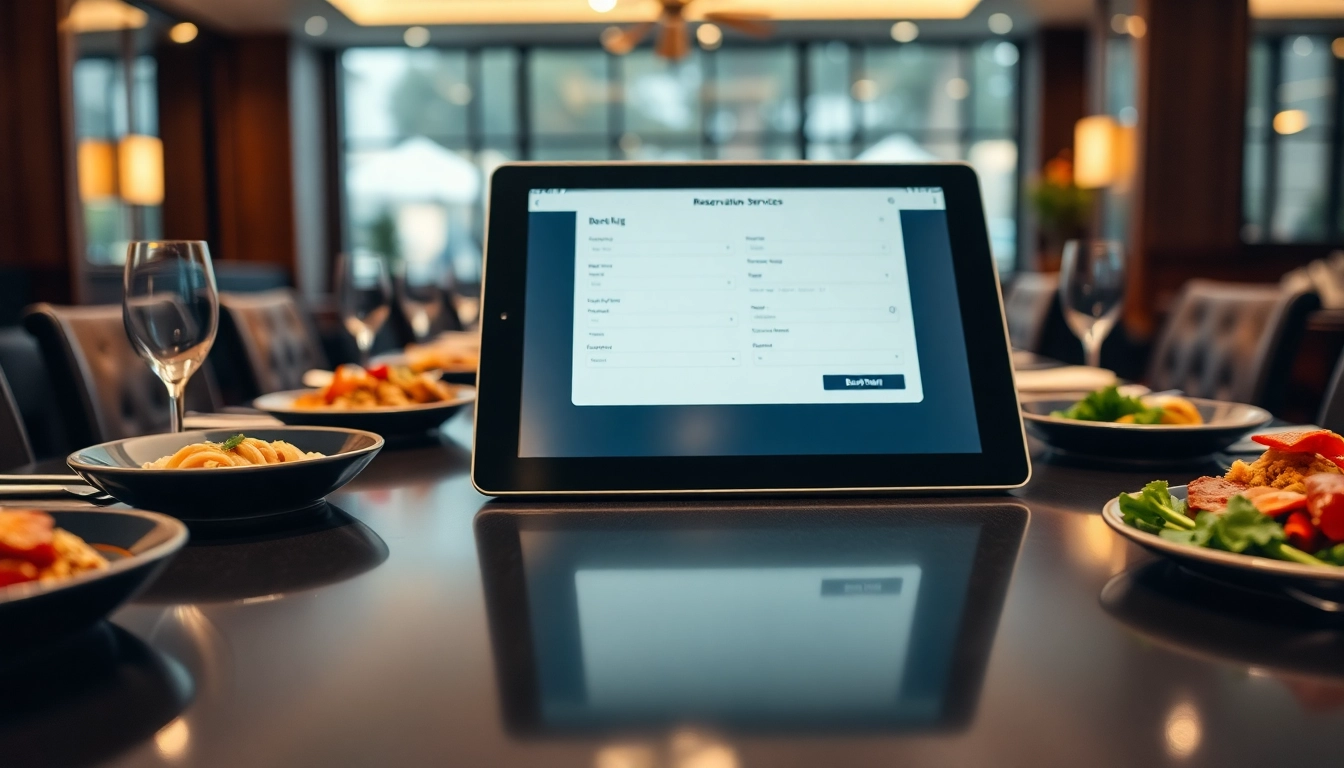Understanding Reservation Services
In today’s fast-paced world, where consumers seek efficiency and quick access to services, reservation services have emerged as a vital component across numerous sectors. From restaurants to healthcare, and from travel to event management, businesses across industries are increasingly adopting reservation services to streamline operations and enhance customer experiences. By efficiently managing bookings and appointments, organizations can focus on delivering exceptional service, minimize wasted resources, and ensure higher levels of customer satisfaction.
What are Reservation Services?
Reservation services refer to organized systems and software that allow individuals to book services or products at a designated time. These systems provide a way to manage availability, confirm bookings, and often facilitate payments, whether for a table at a restaurant, a stay in a hotel, or a slot at a dentist’s office. They can be found in various formats, including online booking platforms, phone reservations, and email confirmations, and are designed to minimize errors and maximize customer convenience.
Importance of Proper Reservation Management
Effective reservation management is crucial for a multitude of reasons:
- Enhances Customer Satisfaction: When customers can secure a reservation quickly and easily, their overall experience is improved, leading to higher satisfaction rates.
- Boosts Operational Efficiency: Automating the reservation process reduces manual errors, allows staff to focus on service delivery, and optimizes resource allocation.
- Increases Revenue: By effectively managing capacity and bookings, businesses can maximize their potential earnings, reducing no-shows and unutilized inventory.
- Improves Customer Insights: Reservation systems often come equipped with analytical features that help businesses track customer preferences and behaviors, allowing for better-targeted marketing and improved service offerings.
Types of Reservation Services in Different Industries
Reservation services are prevalent in numerous industries, each with unique applications:
- Hospitality: Hotels and restaurants utilize reservation systems for managing room bookings and table reservations, allowing for seamless guest experiences.
- Healthcare: Dental offices, clinics, and hospitals implement appointment scheduling systems to manage patient flow, reduce waiting times, and maximize utilization of staff resources.
- Travel and Transportation: Airlines, rail services, and car rental companies rely on robust reservation platforms to manage seat assignments, bookings, and itineraries effectively.
- Events and Entertainment: From concert venues to theaters and amusement parks, reservation services facilitate entry management and ticketing processes.
Key Features of Effective Reservation Systems
To maximize the potential of reservation services, it is essential to choose systems equipped with key features:
Real-Time Availability and Confirmation
One of the hallmark features of an effective reservation system is the ability to provide real-time availability updates. This ensures that customers receive immediate confirmation of their bookings, thereby reducing the chances of double bookings and enhancing the overall customer experience. Real-time systems integrate directly with inventory management, allowing for accurate representation of available resources, such as tables, rooms, or appointment slots.
User-Friendly Interface and Accessibility
An intuitive and user-friendly interface is crucial for both customers and staff. Reservation systems that are easy to navigate reduce dropout rates for online bookings and make it simple for employees to manage bookings without extensive training. Additionally, mobile accessibility allows users to make or modify reservations on the go, catering to the modern consumer’s need for convenience.
Integration with Other Business Tools
Effective reservation systems often integrate seamlessly with other business management tools, such as Customer Relationship Management (CRM) systems, payment processors, and marketing platforms. This interoperability facilitates a streamlined workflow, enhances data collection for strategic decision-making, and allows for personalized customer experiences through targeted communications based on reservation history.
Common Challenges in Reservation Services
While there are numerous benefits to implementing reservation services, businesses may encounter several challenges in doing so:
Handling High Volume Inquiries
During peak periods, businesses may struggle to handle an influx of reservation requests. Without effective management tools, this can lead to overwhelmed staff, longer customer wait times, and lost bookings. To address this, implementing automated systems that can handle basic inquiries or integrating chatbots can significantly improve response times and customer satisfaction.
Ensuring Data Privacy and Security
Collecting customer data for reservation purposes brings about significant responsibilities concerning privacy and security. Businesses must employ robust cybersecurity measures and comply with regulations such as GDPR to protect sensitive information. Regular audits and updates to security protocols can help safeguard against data breaches.
Managing Customer Expectations
Customers today have high expectations for service levels and convenience. If these expectations are not met—whether due to system failures, poor communication, or overbooking—it can lead to dissatisfaction and a damaged reputation. Training staff to communicate effectively with customers in the event of issues arises, along with clear messaging in booking confirmations, can help manage expectations proactively.
Best Practices for Implementing Reservation Services
To successfully implement reservation services, consider the following best practices:
Choosing the Right Platform for Your Business
Selecting the right reservation platform is critical. Businesses should evaluate their size, the volume of reservations, and specific industry needs before making a choice. Conducting trials of different systems and seeking user reviews can inform the final decision. A customizable platform may be beneficial for businesses with unique requirements or offerings.
Training Staff on Reservation Management
Regardless of how intuitive a reservation system may be, proper training for staff is paramount. Training sessions on how to use the system, handle customer inquiries, and troubleshoot common issues will empower employees and ensure consistent service delivery. Additionally, ongoing support and refresher courses can help staff stay current with updates and features.
Collecting and Using Customer Feedback
Customer feedback is invaluable for enhancing the reservation process. Businesses should actively solicit feedback through post-visit surveys or online platforms to understand areas of improvement. Analyzing this feedback and making necessary adjustments can lead to a more efficient booking system and improved customer satisfaction levels.
Measuring Success in Reservation Services
To determine the effectiveness of reservation services, businesses need to track relevant performance metrics:
Key Performance Indicators to Track
Several key performance indicators (KPIs) can help businesses assess their reservation systems:
- Booking Conversion Rate: The percentage of users who complete a reservation after initiating the booking process.
- No-Show Rate: The proportion of bookings that result in customers not attending, indicating potential flaws in the booking process or customer communication.
- Customer Satisfaction Ratings: Feedback and scores from customers regarding their reservation experience, often measured through surveys.
- Revenue per Available Booking: A financial metric that measures how efficiently space or slots are utilized in generating revenue.
Improving Conversion Rates
Enhancing conversion rates requires a combination of user-friendly design, effective marketing strategies, and ongoing customer engagement. Implementing reminders or follow-up communications through automated emails or texts can significantly improve attendance rates and reduce cancellations.
Adapting to Industry Trends and Customer Needs
Market dynamics and customer preferences evolve rapidly. Staying abreast of industry trends, technological advancements, and customer feedback allows businesses to adapt their reservation services accordingly. Regularly revisiting and updating systems ensures the services remain relevant and competitive in the marketplace.




